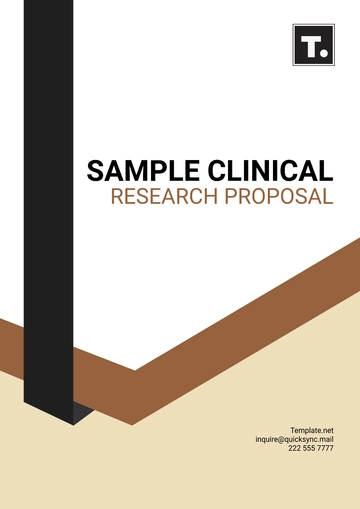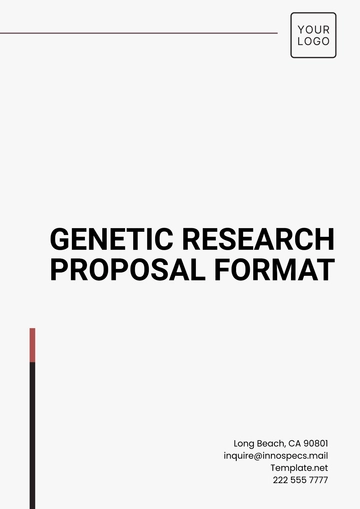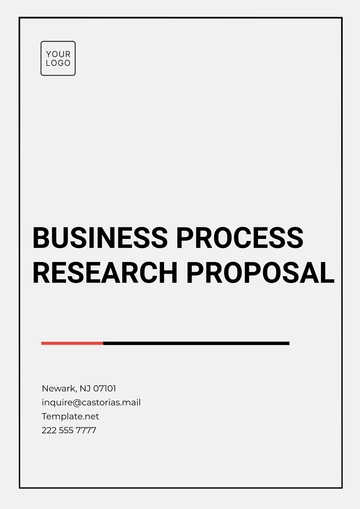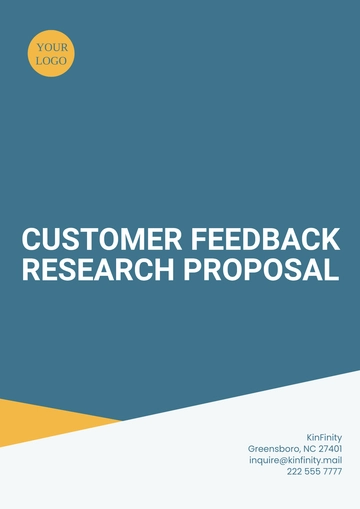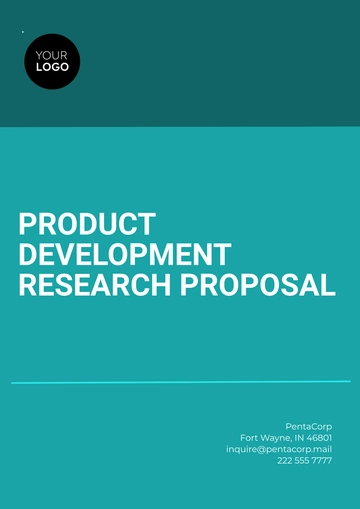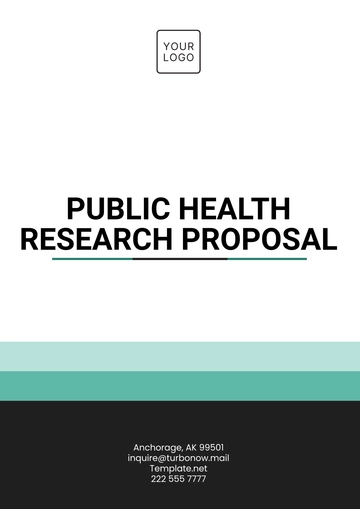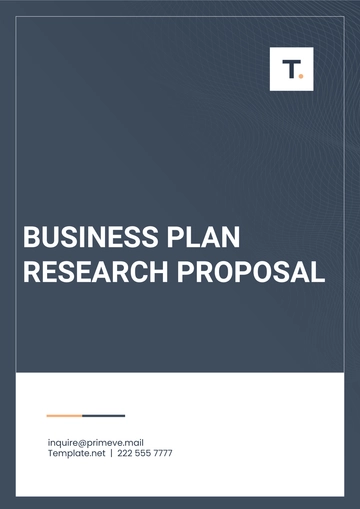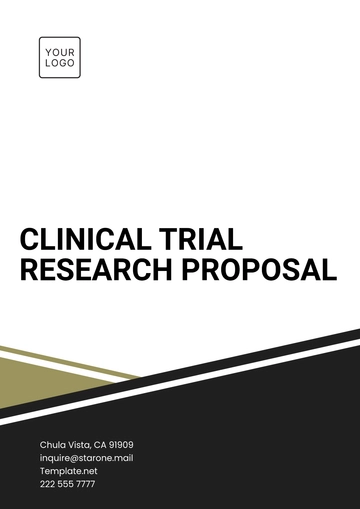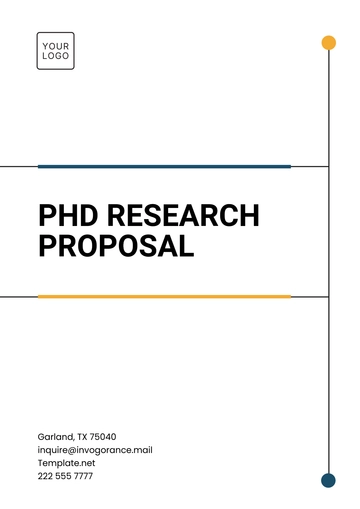Free Mental Health Research Proposal

Prepared By: [Your Name]
I. Introduction
This research proposal seeks to explore the intricate aspects of mental health, which is essential for overall well-being as it affects thoughts, emotions, and behaviors; crucial in stress management, relationship formation, and decision-making. Despite increasing awareness, mental health issues persist as a major global problem, with rising prevalence and significant impacts on quality of life. The study will investigate key contributors to mental health challenges and evaluate current and novel treatment approaches to improve care outcomes.
II. Research Objectives
The primary objectives of this research are to:
Identify the Key Factors Contributing to Mental Health Issues
Examine biological, psychological, and social factors that exacerbate mental health problems.Assess the Effectiveness of Existing Treatment Methods
Evaluate current mental health treatment modalities such as psychotherapy, medication, and digital interventions.Explore Innovative Approaches to Mental Health Care
Investigate emerging therapies and technologies that offer potential improvements in mental health care delivery.
III. Literature Review
A comprehensive literature review was conducted to contextualize this research within existing mental health studies. Below are key findings from relevant studies, along with identified gaps that this proposal seeks to address:
Author | Year | Key Findings |
|---|---|---|
Jones & Smith | 2050 | Identified stress, social isolation, and socioeconomic factors as primary contributors to mental health issues. |
Miller et al. | 2051 | Found cognitive-behavioral therapy (CBT) to be highly effective, especially for anxiety and depression. |
Williams & Brown | 2052 | Highlighted the growing potential of digital health solutions, particularly teletherapy and mobile apps. |
Gaps Identified
Insufficient research on the long-term effectiveness of digital health interventions.
Few studies explore merging innovative technologies with traditional treatments.
Need for nuanced understanding of socio-economic factors and mental health.
IV. Methodology
This research will utilize a mixed-methods approach to capture both qualitative and quantitative data, providing a comprehensive analysis of mental health issues.
A. Qualitative Methods
In-Depth Interviews: Conduct one-on-one interviews with mental health professionals and individuals with lived experiences to gain deep insights into the personal and clinical aspects of mental health.
Focus Groups: Organize group discussions among different demographics to explore collective perspectives and identify common challenges.
B. Quantitative Methods
Surveys: Distribute structured surveys to a broad population sample, aiming to collect data on mental health prevalence, treatment experiences, and perceptions of care.
Standardized Questionnaires: Use validated tools such as the Patient Health Questionnaire (PHQ-9) and Generalized Anxiety Disorder 7 (GAD-7) to assess the severity of mental health symptoms.
C. Data Analysis
Qualitative Analysis: Employ thematic analysis to interpret interview and focus group data, identifying recurrent themes and unique insights.
Quantitative Analysis: Utilize statistical techniques, including regression analysis and ANOVA, to examine relationships between variables and assess the effectiveness of treatment methods.
V. Expected Outcomes
The expected outcomes of this research include:
Enhanced Understanding of Mental Health Factors: A detailed analysis of the contributing factors, offering insights into preventive measures.
Critical Evaluation of Treatment Methods: Evidence-based assessments of current treatment practices, identifying strengths and areas for improvement.
Recommendations for Innovative Approaches: Propose new, evidence-backed approaches to mental health care, incorporating the latest advancements in digital health and therapeutic practices.
VI. Timeline
The proposed research will be conducted over 12 months, with the following phased activities:
Phase | Duration | Activities |
|---|---|---|
Preparation | Months 1-2 | Conduct a thorough literature review, finalize the methodology design. |
Data Collection | Months 3-6 | Conduct interviews, focus groups, and surveys; gather and organize data. |
Data Analysis | Months 7-9 | Perform qualitative and quantitative data analysis, synthesize findings. |
Report Writing | Months 10-12 | Compile research findings, draft the final report, and prepare for publication. |
VII. Budget
The estimated budget for this research is as follows:
Item | Cost | Description |
|---|---|---|
Personnel | $20,000 | Includes salaries for research assistants, data analysts, and other support staff. |
Materials and Supplies | $5,000 | Costs for research materials, software licenses, and data collection tools. |
Travel | $3,000 | Expenses for travel to conduct interviews and focus groups across different locations. |
Miscellaneous | $2,000 | Covers unexpected expenses, administrative costs, and contingency funds. |
VIII. References
Jones, A., & Smith, B. (2050). Factors Contributing to Mental Health Issues. Journal of Mental Health Studies, 20(1), 45-67. DOI: 10.1016/j.mhs.2050.01.002
Miller, C., et al. (2051). The Effectiveness of Cognitive-Behavioral Therapy. Psychological Treatment Analysis, 15(3), 99-115. DOI: 10.1016/j.pta.2051.02.003
Williams, D., & Brown, E. (2052). Digital Health Solutions for Mental Health. Journal of Digital Medicine, 22(4), 130-145. DOI: 10.1016/j.jdm.2052.04.004
- 100% Customizable, free editor
- Access 1 Million+ Templates, photo’s & graphics
- Download or share as a template
- Click and replace photos, graphics, text, backgrounds
- Resize, crop, AI write & more
- Access advanced editor
Advance mental health studies with Template.net's Mental Health Research Proposal Template. This editable and customizable template offers a structured approach for detailing your research goals, methodologies, and potential impacts. Editable in our AI Editor Tool, it ensures your mental health research proposal is comprehensive and well-organized, effectively communicating the importance of your work in addressing critical mental health issues.
You may also like
- Business Proposal
- Research Proposal
- Proposal Request
- Project Proposal
- Grant Proposal
- Photography Proposal
- Job Proposal
- Budget Proposal
- Marketing Proposal
- Branding Proposal
- Advertising Proposal
- Sales Proposal
- Startup Proposal
- Event Proposal
- Creative Proposal
- Restaurant Proposal
- Blank Proposal
- One Page Proposal
- Proposal Report
- IT Proposal
- Non Profit Proposal
- Training Proposal
- Construction Proposal
- School Proposal
- Cleaning Proposal
- Contract Proposal
- HR Proposal
- Travel Agency Proposal
- Small Business Proposal
- Investment Proposal
- Bid Proposal
- Retail Business Proposal
- Sponsorship Proposal
- Academic Proposal
- Partnership Proposal
- Work Proposal
- Agency Proposal
- University Proposal
- Accounting Proposal
- Real Estate Proposal
- Hotel Proposal
- Product Proposal
- Advertising Agency Proposal
- Development Proposal
- Loan Proposal
- Website Proposal
- Nursing Home Proposal
- Financial Proposal
- Salon Proposal
- Freelancer Proposal
- Funding Proposal
- Work from Home Proposal
- Company Proposal
- Consulting Proposal
- Educational Proposal
- Construction Bid Proposal
- Interior Design Proposal
- New Product Proposal
- Sports Proposal
- Corporate Proposal
- Food Proposal
- Property Proposal
- Maintenance Proposal
- Purchase Proposal
- Rental Proposal
- Recruitment Proposal
- Social Media Proposal
- Travel Proposal
- Trip Proposal
- Software Proposal
- Conference Proposal
- Graphic Design Proposal
- Law Firm Proposal
- Medical Proposal
- Music Proposal
- Pricing Proposal
- SEO Proposal
- Strategy Proposal
- Technical Proposal
- Coaching Proposal
- Ecommerce Proposal
- Fundraising Proposal
- Landscaping Proposal
- Charity Proposal
- Contractor Proposal
- Exhibition Proposal
- Art Proposal
- Mobile Proposal
- Equipment Proposal
- Student Proposal
- Engineering Proposal
- Business Proposal
